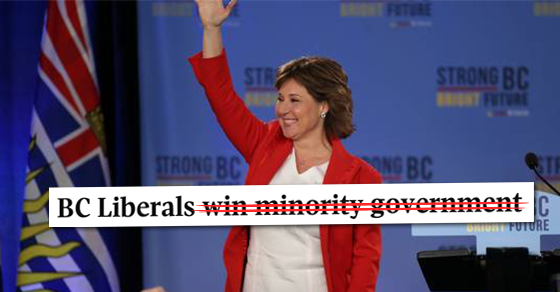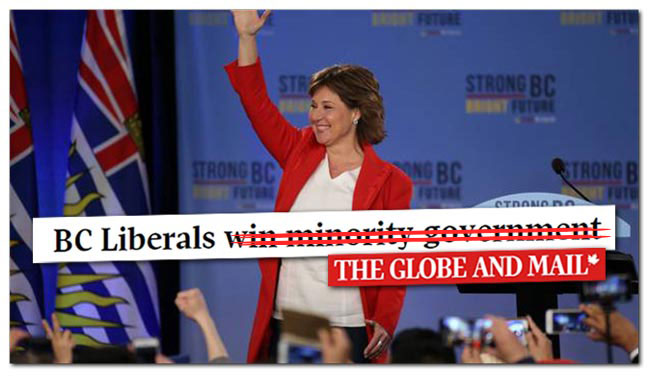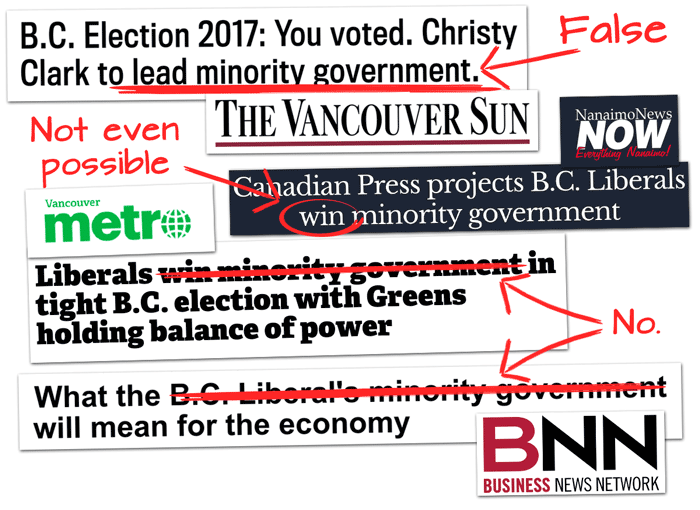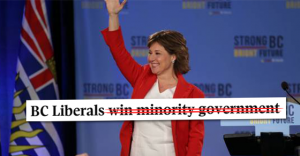
Don’t listen to the headlines. Christy Clark absolutely did not ‘win’ a minority government
"It's false to report the election resulted in a B.C. Liberal minority government."
As British Columbians woke up the morning after Tuesday’s provincial election, many headlines reported Christy Clark’s BC Liberals had “won a minority government.”
Just one problem – the BC Liberals did not “win” a minority government.

Leaving aside the fact that 176,000 absentee ballots remain to be counted – enough votes to shake-up the final seat count, so it’s still anybody’s ball game – these kinds of headlines paint a dangerously misleading picture of how Canadian democracy actually works.
Canada is a representative Westminster democracy – that means voters don’t directly elect governments or premiers or prime ministers, we only elect parliaments (or legislatures).
Why does splitting hairs over this detail matter? Because in the Canadian system, the government is not chosen by voters – voters choose representatives and representatives work together to form governments. That’s just how things work.
In British Columbia and all across Canada, governments are led by whoever is able to command the confidence of the House (or Legislature). As BC political blogger Steve Tweedale recently explained:
“Assuming the preliminary count holds up, the outcome of the election is a hung parliament (sometimes called a minority parliament), meaning that no single party has a majority of seats. Under B.C.’s parliamentary system of government, elections determine the composition of the Legislative Assembly; they do not determine the composition of the government.”
So, as DeSmog Canada summed it up:
“It’s false to report the election resulted in a B.C. Liberal minority government.”
Yet that’s exactly what many headlines said Wednesday morning:

While it’s true the BC Liberals are currently leading in the seat count, they do not have enough seats to form government on their own and they definitely did not win the right to form government either.
Here’s the Mowat Centre’s Mark D. Jarvis explaining how governments in Canada are formed:
Again people, the rules of government formation.Have them tattooed on you. pic.twitter.com/JAV4td4JfC
— mark d. jarvis (@markdjarvis) September 5, 2015
So, whoever has the most MLAs would get first crack at putting together a new government. But if the party with the most MLAs can’t secure the confidence of a majority of all MLAs in the BC Legislature, then the opposition parties can try to make a deal to win the confidence of the Legislature.
In this case, if the current seat count more or less holds up, it looks like it might fall on Andrew Weaver’s Greens to decide if they’ll prop up Clark’s Liberals or work with the NDP to remove Clark from power.
It’s understandable if this all seems confusing – Clark herself seems to be going out of her way to sow confusion and create false impressions.
It seems like Christy Clark is reading her winners speech. She didn’t win tonight. There is still so much to be decided. #bcvotes
— Richard Zussman (@richardzussman) May 10, 2017
Then again, Clark’s faux victory speech shows she doesn’t want to let go of the reins of power – and headlines claiming she “won” something she did not actually “win” only help her create the false impression she is the only one with the authority to govern.
She is not.
Photo illustration: Globe and Mail, Twitter.
Our journalism is powered by readers like you.
We’re an award-winning non-profit news organization that covers topics like social and economic inequality, big business and labour, and right-wing extremism.
Help us build so we can bring to light stories that don’t get the attention they deserve from Canada’s big corporate media outlets.
Donate





